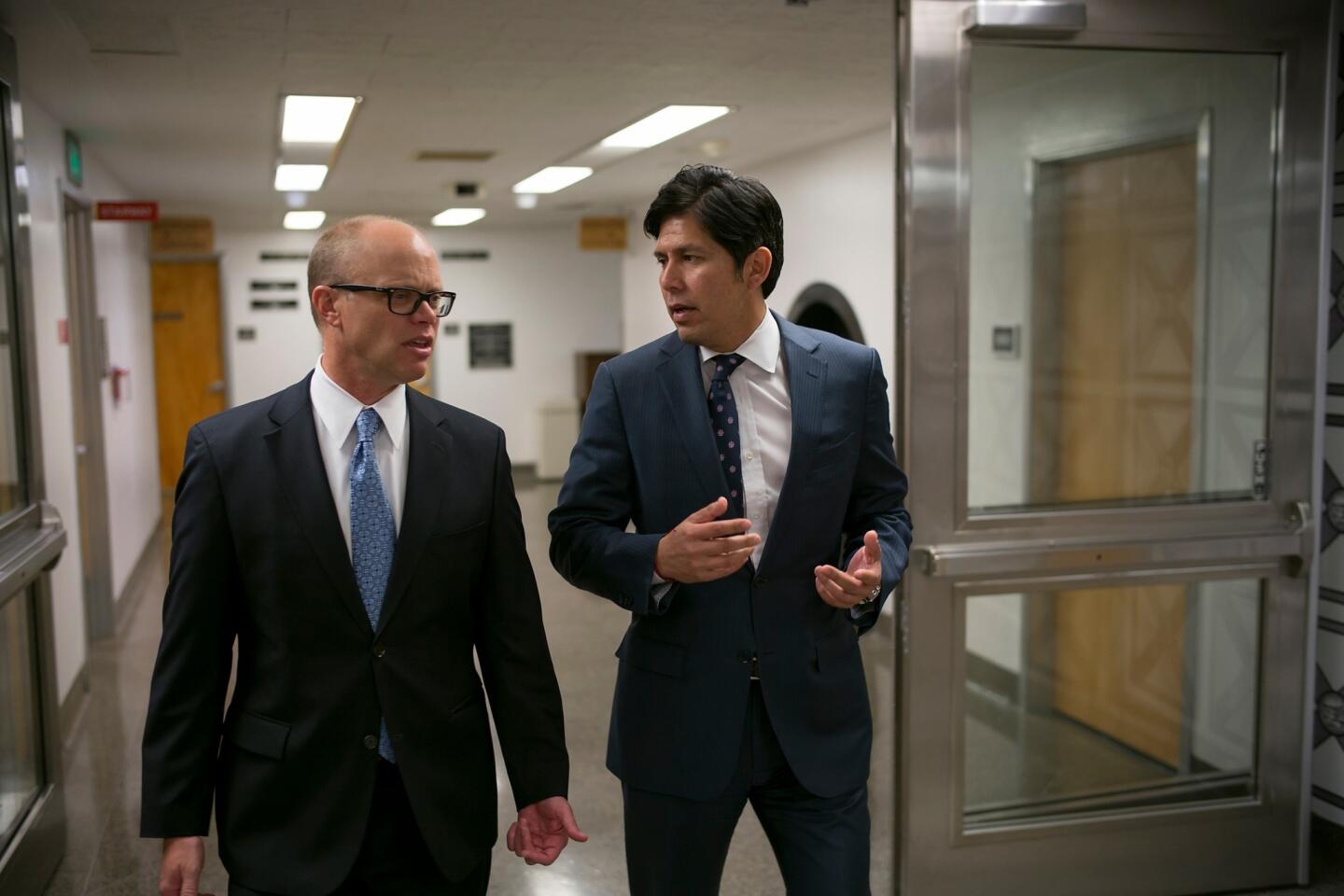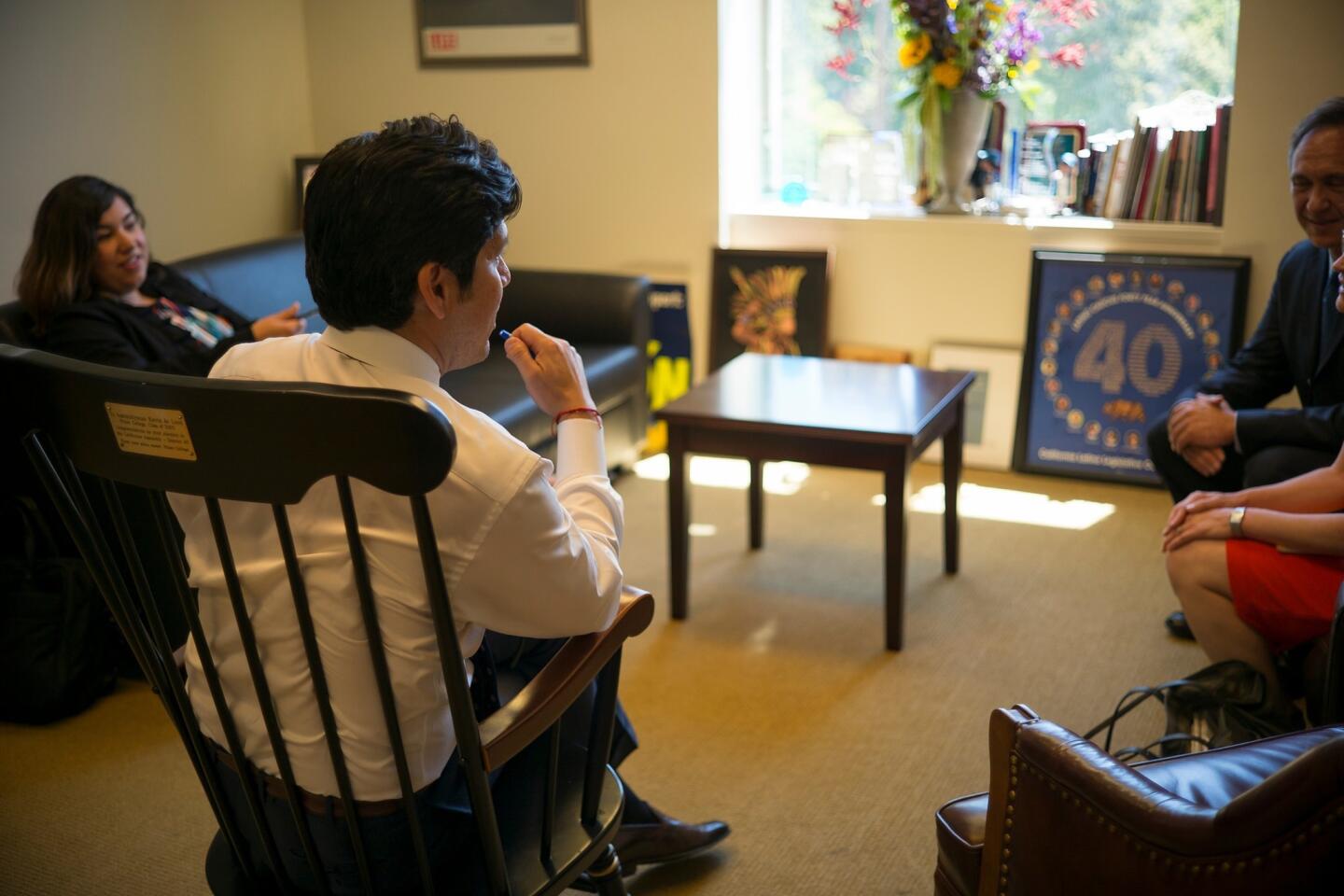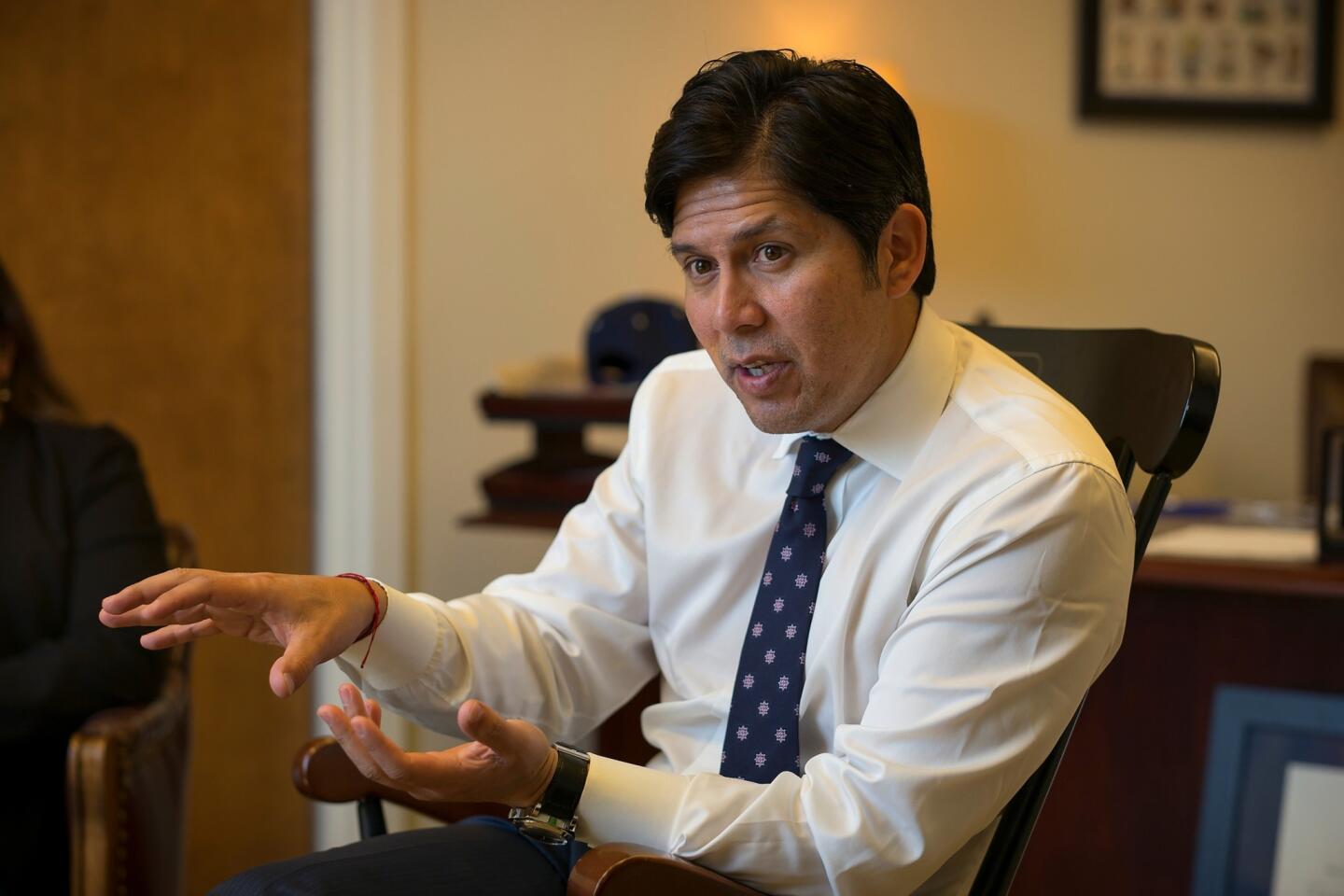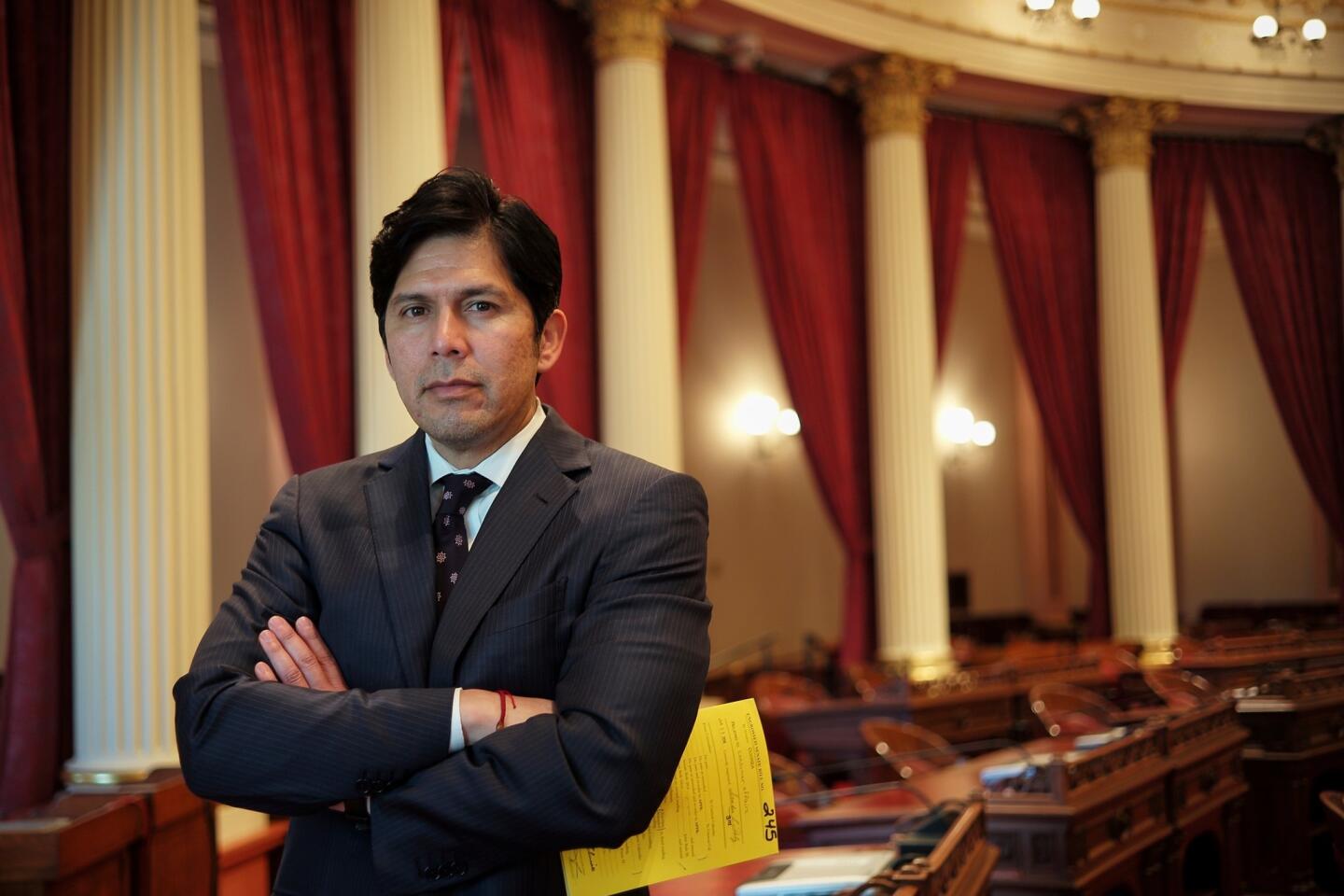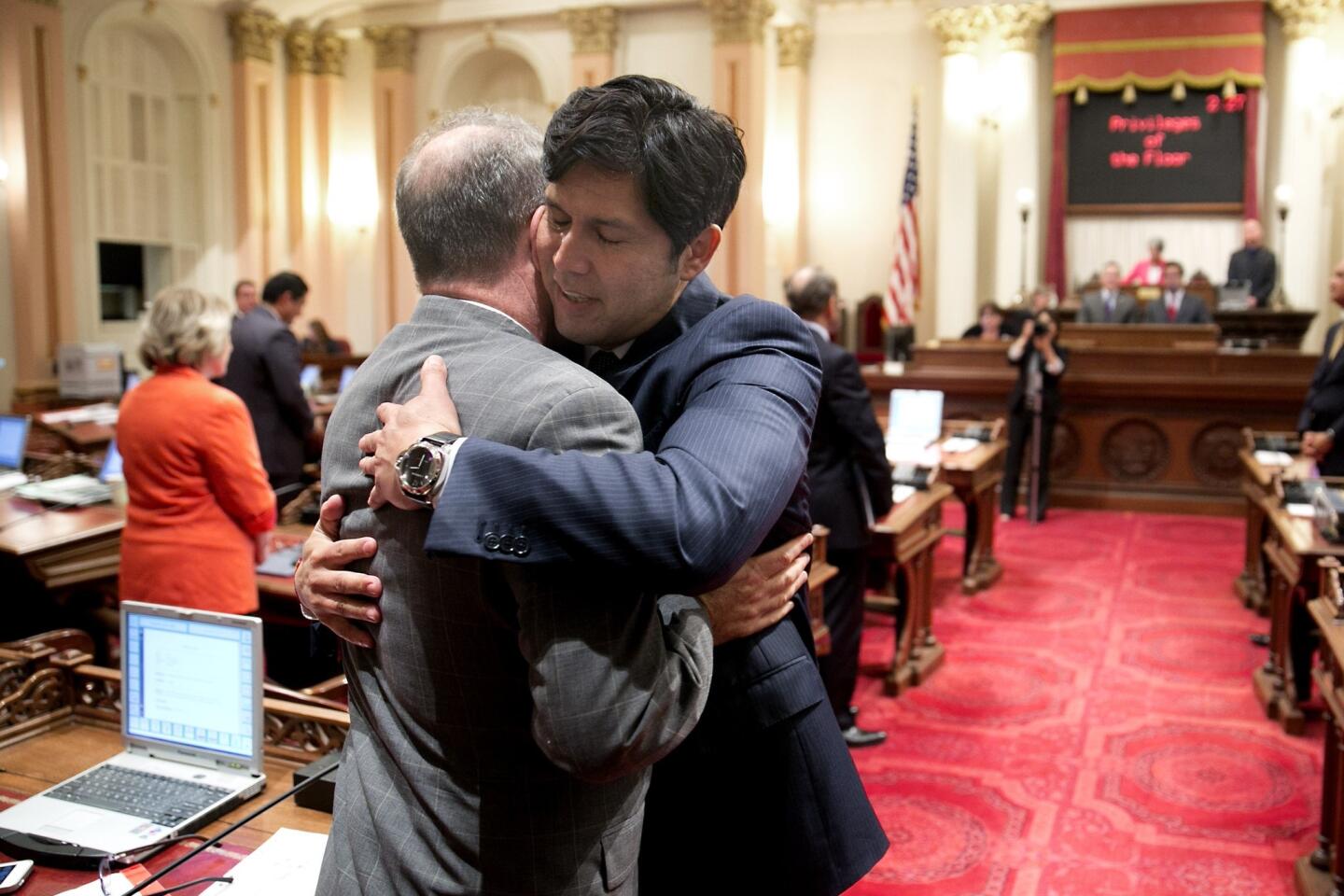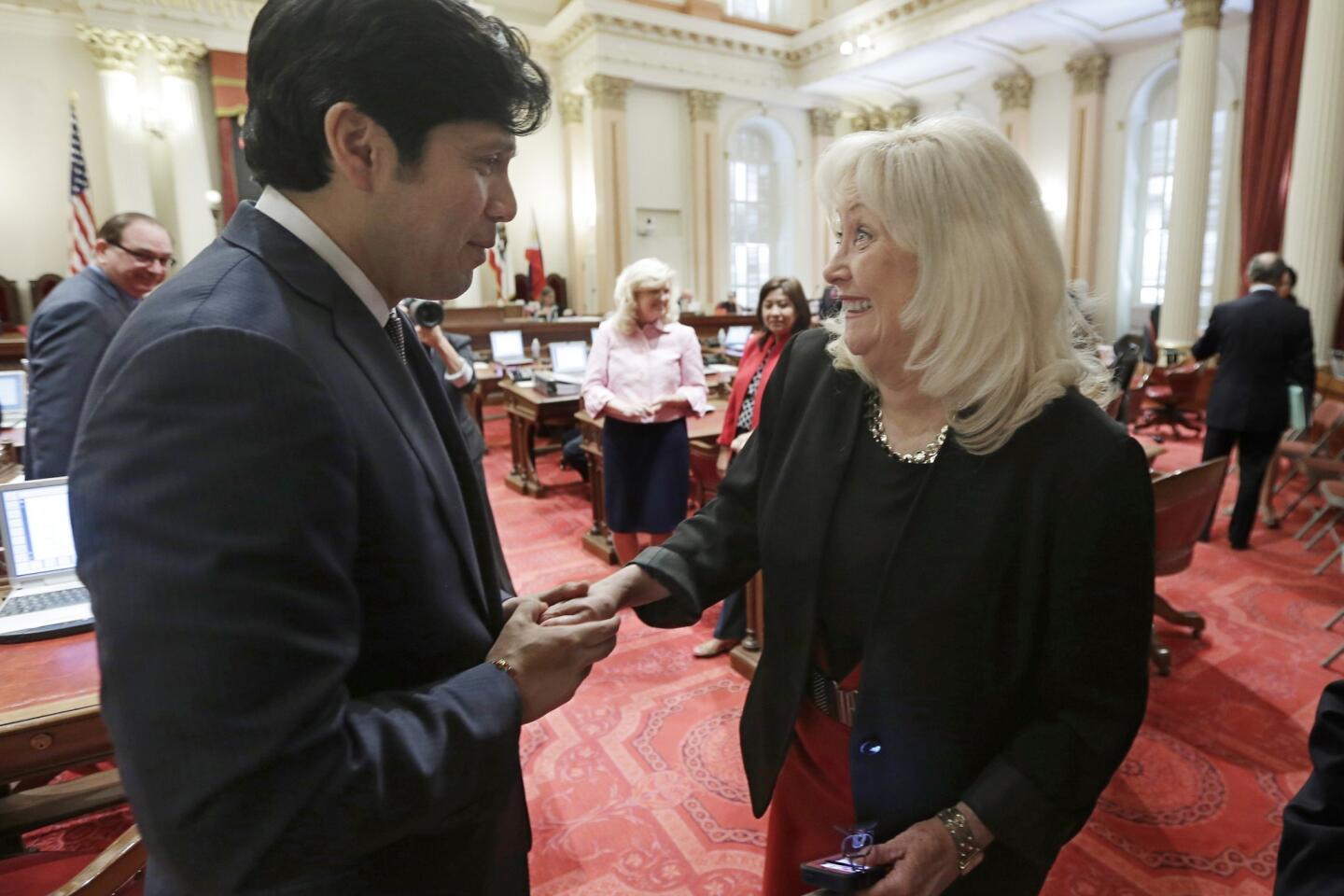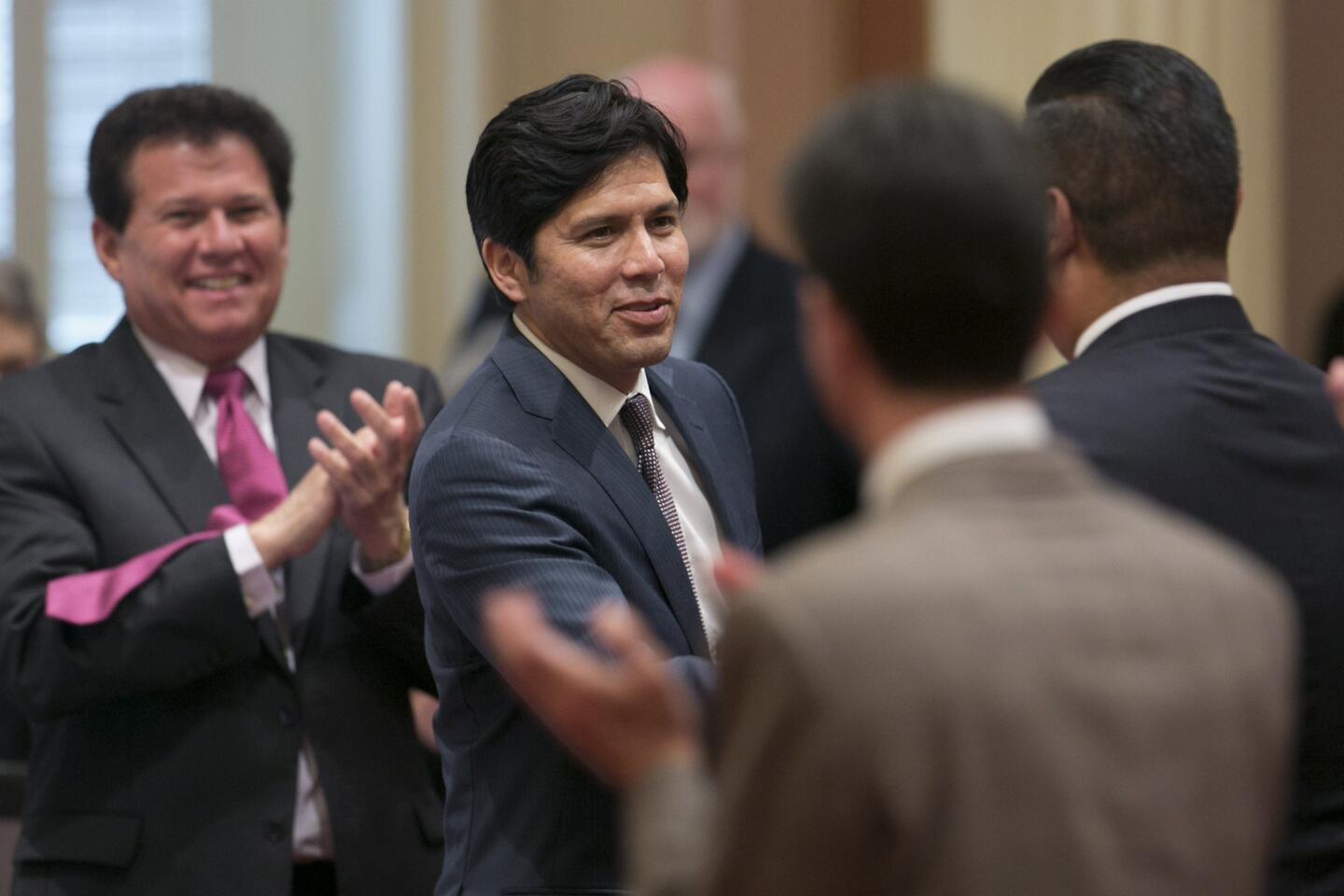Setback put Kevin de León on the path to Senate leadership
- Share via
reporting from SACRAMENTO — Kevin de León thought his political career might be over.
After losing a bitter contest for the California Assembly speakership to John Pérez in 2009, De León was stripped of his coveted Appropriations Committee chairmanship and moved to one of the dreariest offices in the Capitol.
“When they put you in one of the smallest offices, next to the cafeteria, where you can hear people ordering sandwiches, you have sunk low,” the Los Angeles Democrat said recently.
De León, 47, salted away the humiliation, saying that the experience made him wiser. With help of some powerful allies, including former Los Angeles Mayor Antonio Villaraigosa and billionaire Tom Steyer, De León not only revived his career, but on Monday reached a pinnacle in state politics.
De León was elected leader of the state Senate, becoming the first Latino to hold that post since 1883. It was quite an achievement for a kid from a San Diego barrio, the son of a single mother from Mexico. She at one point was in the U.S. illegally and took a cross-town bus each day to wealthy, beach-side neighborhoods to clean homes.
“It’s an improbable journey not just within the context of the political roller coaster but also where I came from,” De León said.
His ascent reflected the deft political instincts, and good fortune, that have been apparent from his first foray into politics. De León won a Los Angeles Assembly seat in 2006 by beating a rival with a golden family name, Christine Chavez, the granddaughter of labor leader Cesar E. Chavez.
De León’s early connection to the district, the heart of the heavily Latino neighborhoods downtown and in nearby areas, was somewhat tenuous. He grew up in San Diego and had been hopscotching around the state. But the former union organizer for the California Teachers Assn. had support from the Los Angeles County Federation of Labor and one of his closest friends since childhood — Fabian Nuñez, who was then the powerful Assembly speaker.
“He had all the heavy hitters,” recalled Chavez, who now works at U.S. Department of Agriculture in Washington, D.C.
De León and Nuñez — both sons of Mexican immigrants — were born 17 days apart and grew up in the same San Diego neighborhood of Logan Heights. They graduated from high school together and attended Pitzer College together.
De León and Nuñez also were side by side when they came of age politically two decades ago.
Both worked at the One Stop Immigration Center in Los Angeles and organized against Proposition 187, the controversial 1994 ballot measure to deny many public services to immigrants who were in the country illegally. They led a march that drew 80,000 supporters of immigrant rights to downtown Los Angeles to protest the proposition. (California voters approved the measure, although the federal courts later declared it unconstitutional.)
Nuñez went on to work for the labor federation while De León took jobs as an advocate for the National Education Assn. and California Teachers Assn. When Nuñez decided to run for the state Assembly in 2002, De León served as his campaign manager. In 2006, when Nuñez was Assembly speaker, he encouraged De León to run for the Assembly.
By 2009, De León thought he had the votes sewn up to become speaker. But too many Assembly members found De León’s ambitious nature grating, eroding his support.
“I think that is the best thing that could have happened to him because he got some taste of humble pie and had an opportunity to rebuild himself and to re-engage with his own sense of purpose,” Nuñez said. “I think that was a turning point in his political career.”
At the encouragement of Senate President Darrell Steinberg (D-Sacramento), De León revived his political career with a successful run for the state Senate in 2010, and quickly rose to become chairman of the powerful Appropriations Committee.
De León, who lives in Mount Washington, also struck a political alliance with San Francisco billionaire environmental activist Thomas Steyer, founder of Farallon Capital Management. With Steyer contributing more than $21 million, the two co-chaired the 2012 campaign for Proposition 39, which closed a corporate tax loophole and provided hundreds of millions of dollars for environmental programs.
“Our friendship has continued to this day because we are both passionate about justice for all Californians, including environmental justice,” Steyer said.
Throughout his legislative career, De León focused much of his efforts on bills affecting the environment, the working poor, immigration and public safety. He was instrumental in last year’s passage of a bill providing driver’s licenses to immigrants in the country illegally, and made national headlines in 2012 by proposing a first-of-its-kind, state-run retirement savings plan for low-income workers.
On Monday, the Senate elected De León as leader in a unanimous voice vote. Colleagues described De León as smart and fair. Several praised his devotion as a single father of a 20-year-old daughter, Lluvia, who is a student at St. Mary’s College in Moraga, Calif.. De León has never been married.
But, some activists in De León’s district say that he is part of a Sacramento power structure that is too cozy with special interests.
Democrat Peter Choi, president and chief executive officer of the Temple City Chamber of Commerce, is challenging De León in the November election. He called the incumbent a “professional politician.”
As an example, Choi cited De León’s opposition to a statewide ban on plastic grocery bags last year. A South Carolina bag maker, Hilex Poly, had employed the lobbying firm Mercury Public Affairs to oppose the ban. Nuñez is a partner at Mercury.
De León said his concern about the bill, which was defeated, was that it would have cost jobs at a manufacturing plant in his district. This year, De León has negotiated support for a similar bill that would have the state provide $2 million to retool manufacturing plants and retrain workers who make plastic bags.
Nuñez and De León said there is a “firewall” that separates their relationship from their professional duties. Nuñez said he has not lobbied De León on the plastic bag bill or any other legislation.
Choi’s campaign has also made an issue of criminal charges filed against one of De León’s fellow senators.
De León was subpoenaed by a federal grand jury to testify as part of the investigation into Sen. Ronald S. Calderon (D-Montebello). Calderon has been charged with accepting nearly $100,000 in bribes for official actions on bills involving workers’ compensation claims and film tax credits.
Choi noted that De León’s name appears 56 times in an FBI affidavit in the case. In the affidavit, Calderon said De León helped arrange a $25,000 contribution to a nonprofit run by Calderon’s brother to resolve a leadership dispute in the California Legislative Latino Caucus.
“Certainly it is a concern when the elected senator for my district is mentioned in the fashion that he was in the FBI affidavit against Ron Calderon,” Choi said.
De León has not been charged and he denies that he arranged the contribution. The senator released a letter from the assistant U.S. attorney in charge of the case saying that he is a witness, not a target in the federal investigation.
The president pro tem-elect, who takes over Oct. 15, has led efforts to install tougher ethics laws since Calderon’s indictment, including a resolution barring political fundraising during the last month of the Senate session.
“He is very concerned about the events of the last year and he is very focused on restoring trust in the institution,” Villariagosa said.
More to Read
Sign up for Essential California
The most important California stories and recommendations in your inbox every morning.
You may occasionally receive promotional content from the Los Angeles Times.
